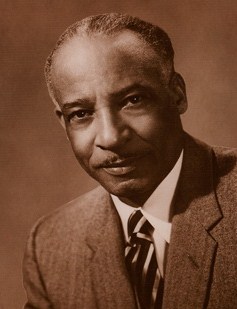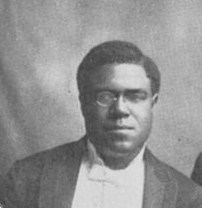Christmas Classics PERSON OF THE DAY: William L. Dawson
On this day in 1898, William Levi Dawson was born in Anniston, Alabama. He was an acclaimed African-American composer, conductor, and trombonist who wrote a wonderful arrangement of the Christmas spiritual Mary Had a Baby, a carol with two distinct lyrical texts. In some circles Dawson was called the “father of the Negro spiritual” although such a sobriquet might be contested by the John Works family also noted for its scholarship of Negro folk music.
Dawson was determined to earn a music education. Although black students were prohibited from attending classes, several professors helped him to clandestinely pursued his bachelor degree at night from the Horner Institute of Fine Arts in Kansas City. By day he taught at the city’s Lincoln High School. His formal studies continued at the Chicago Musical College and the American Conservatory of Music, the latter from which he earned his master degree. He also enjoyed a career as a trombonist for both the Civic Orchestra of Chicago and Redpath Chautauqua, a campground assembly that usually gathered during the summer for music events or literary, moral, and scientific lectures.
The composer’s career, however, was primarily devoted to teaching at the college level. In 1931 he went to teach at Tuskegee University in Alabama where he soon himself the founding chairperson of its School of Music. During his tenure at Tuskegee, ending in 1956, Dawson achieved greatness as a composer. His body of work included arrangements and variations of spirituals, including his popular Ezekiel Saw the Wheel, King Jesus is a-Listening, and Jesus Walked the Lonesome Valley, and other spirituals that are widely published and regularly performed by school and community choral programs. In the classical realm, he is best known for Negro Folk Symphony, reputedly the first of its kind by a black composer, which premiered in 1934 with the Philadelphia Orchestra under the direction of the dynamic Leopold Stokowski.
The lyrical text of Mary Had a Baby may date from the 18th century when it was probably sung at religious revival camp meetings where a “call and response” technique was utilized to unify the congregation in worship. After the Civil War, this musical style became more prevalent in black churches, especially those of the rural South, whose members learned it from their ancestors, almost all of whom were slaves.
As with most of his arrangements, Dawson employed black folk song idioms to Mary Had a Baby, an important addition to AMERICAN CHRISTMAS CLASSICS . Inspired by the spiritual text, he creates a heightened sense of dignity, despite the humble manger setting, of Mary the mother giving birth to her baby who is richly exalted as “King Jesus.”
Christmas Classics PERSON OF THE DAY: John Wesley Work, Jr.
Also on this day in 1871, John Wesley Work, Jr. was born in Nashville, Tennessee. Considered one of the first, if not the first, serious black collector of Negro folk songs, he too studied Latin and Greek, as well as history, and taught the two classic languages after he received a Master’s degree from Fisk University in 1898.
For the next twenty-five years Work Jr. became a leader in the effort to study and preserve Negro spirituals. At the same time he organized Fisk singing groups, and with the help of his wife Agnes and his brother Frederick Jerome Work, collected and published a number of collections of slave songs and spirituals. The first of these collections was New Jubilee Songs as Sung by the Fisk Jubilee Singers (1901).
Six years later he published, and may have composed, the remarkable spiritual Go Tell It on the Mountain, as part of New Jubilee Songs and Folk Songs of the American Negro.
Many of the spirituals the Works collected had originally been sung by their forebears as they toiled in the fields, or at difficult manual labor, during the dark age of slavery. It was one way of establishing relationships and feeling that God was near. The story of Christmas, of God’s Son being born as man to redeem and free man of his sins, was important in itself and as a symbol of hope in their quest for freedom
The legacy of Negro spirituals was important to Work Jr. as he became both the leader and performer of the Fisk University Jubilee Singers, the historic choral group founded in 1871 for the purpose of raising funds for the post-Civil War black college whose severe financial problems almost shut the school down. The Jubilee Singers, who took their name from the year of freedom in the Bible, were quite successful on their tours of the United States and Europe, which included a bravo performance for Queen Victoria of England, and in the process they raised the Negro spiritual to an art form.
For eighteen years Work Jr. served as leader of the Jubilee Singers until negative opinion set in at Fisk against the Negro spiritual as only a painful reminder of slavery. This groundswell of negative feelings toward black folk music forced Work Jr. to resign his leadership post in 1923. For the balance of his life, he served as president of Roger Williams University until his death on September 7, 1925.


